Readings Newsletter
Become a Readings Member to make your shopping experience even easier.
Sign in or sign up for free!
You’re not far away from qualifying for FREE standard shipping within Australia
You’ve qualified for FREE standard shipping within Australia
The cart is loading…






This title is printed to order. This book may have been self-published. If so, we cannot guarantee the quality of the content. In the main most books will have gone through the editing process however some may not. We therefore suggest that you be aware of this before ordering this book. If in doubt check either the author or publisher’s details as we are unable to accept any returns unless they are faulty. Please contact us if you have any questions.
The integration of generative AI and deep learning techniques for Alzheimer's disease detection significantly impacts the research community by advancing diagnostic accuracy and providing a comprehensive understanding of the disease. By combining multiple data modalities, including imaging, genetics, and clinical data, researchers can improve diagnostic precision and develop personalized treatment strategies. Generative AI facilitates efficient data utilization through dataset augmentation, fostering innovation and collaboration across interdisciplinary fields. These methodologies forward the exploration of new diagnostic tools while expediting their application in clinical practice, benefiting patients through early detection and intervention. The incorporation of generative AI may enhance research capabilities, promote collaboration, and improve Alzheimer's disease management and patient outcomes. Deep Generative Models for Integrative Analysis of Alzheimer's Biomarkers explores the integration of deep generative models in disease diagnosis, biomarking, and prediction. It examines the use of tools like data analysis, natural language processing, and machine learning for effective Alzheimer's research. This book covers topics such as data analysis, biomedicine, and machine learning, and is a useful resource for computer engineers, biologists, scientists, medical professionals, healthcare workers, academicians, and researchers.
$9.00 standard shipping within Australia
FREE standard shipping within Australia for orders over $100.00
Express & International shipping calculated at checkout
This title is printed to order. This book may have been self-published. If so, we cannot guarantee the quality of the content. In the main most books will have gone through the editing process however some may not. We therefore suggest that you be aware of this before ordering this book. If in doubt check either the author or publisher’s details as we are unable to accept any returns unless they are faulty. Please contact us if you have any questions.
The integration of generative AI and deep learning techniques for Alzheimer's disease detection significantly impacts the research community by advancing diagnostic accuracy and providing a comprehensive understanding of the disease. By combining multiple data modalities, including imaging, genetics, and clinical data, researchers can improve diagnostic precision and develop personalized treatment strategies. Generative AI facilitates efficient data utilization through dataset augmentation, fostering innovation and collaboration across interdisciplinary fields. These methodologies forward the exploration of new diagnostic tools while expediting their application in clinical practice, benefiting patients through early detection and intervention. The incorporation of generative AI may enhance research capabilities, promote collaboration, and improve Alzheimer's disease management and patient outcomes. Deep Generative Models for Integrative Analysis of Alzheimer's Biomarkers explores the integration of deep generative models in disease diagnosis, biomarking, and prediction. It examines the use of tools like data analysis, natural language processing, and machine learning for effective Alzheimer's research. This book covers topics such as data analysis, biomedicine, and machine learning, and is a useful resource for computer engineers, biologists, scientists, medical professionals, healthcare workers, academicians, and researchers.